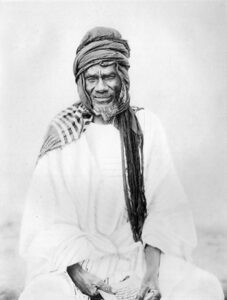
Samori Ture
*The birth of Samori Ture is celebrated on this date in 1828. Also known as Almamy Samore Lafiya Toure, he was a Malinke and a Soninke Muslim cleric, slave owner, and military strategist.
Samori Ture was born in Manyambaladugu, Guinea, the son of Kemo Lanfia Ture, a Dyula weaver and merchant, and Sokhona Camara. The family moved, and Ture grew up as West Africa was being transformed through growing contacts and trade with the white Europeans in commodities, artisan goods, and products, including slavery. Ture was a troublesome youth, leading a group of local boys who would steal fruit from fields. To put him on a better path, his father bought him some merchandise and sent him off to become a merchant trading kola nuts from the coast for cloth.
White European trade made some African trading states rich. The trade in firearms changed traditional West African patterns of warfare and heightened the severity of conflicts, increasing the number of fatalities. In 1853, Sanankoro was raided by the Cissé clan, and Samory's mother was captured by Prince Sere Brahima, whose older brother, Sere Bourlaye, was the king of Madina. He went to Madina to exchange himself for his mother and was a warrior for the Cissé for seven years. In their service, he learned to handle firearms, the arts of war, and discipline, and converted to Islam. Brave and intelligent, he moved quickly up the ranks. Sere Bourlaye died in 1859. Soon afterwards, Sere Brahima, who succeeded him, freed Samory and his mother, and they returned to Sanankoro.
According to tradition, he remained "seven years, seven months, seven days" before leaving with his mother. At the time, the Manding region had many war bands that were indistinguishable from bandits. Unable to settle into a peaceful life, Samory joined one of these groups but, with his reputation as a warrior, came into conflict with the incumbent leader. After being whipped for insubordination, he left to form another band, which he soon took control of. His force extorted money from passing peasants until the village accepted Samory's authority; then they moved on. Their first serious obstacle was the fortified village of Tere, defended by Sere Brema's governor in the region.
Samory failed both to capture it and to bribe the governor, Dianka, into switching sides. Still, he managed to capture all of the Toron region either by force or diplomacy, building alliances with the powerful Konate family of Gbodou and the leaders of Bissandougou, and taking the village of Faranfina by a ruse. This first expansionist phase, lasting from 1866 to 1873, saw Samory's army and influence grow dramatically as members of his mother's Camara clan and numerous other volunteers were attracted by his success. A profoundly religious Muslim of the Maliki school of Sunni Islam's religious jurisprudence, he organized his empire and justified its expansion using Islamic principles. Ture resisted French colonial rule in West Africa from 1882 until his capture in 1898.
On December 22, 1898, Samori Ture was condemned to exile, despite his wish to return to southern Guinea. His wife, Saranken Konate, refused to accompany him. Emotionally devastated, he was taken to Saint-Louis, Senegal, on January 4, 1899. He attempted suicide the night before he was scheduled to be deported to Gabon, but survived and finally embarked on February 5. The prison camp where Samori Ture spent his last years, the small island of Missanga in the middle of the Ogooué River, was known as the 'dry guillotine' due to the death rate among prisoners. Samori Ture, founder of an empire that stretched across present-day northwestern and eastern Guinea, northeastern Sierra Leone, southern Mali, and part of southern Burkina Faso, died there of pneumonia on June 2, 1900. He was the great-grandfather of Guinea's first president, Ahmed Sékou Touré.